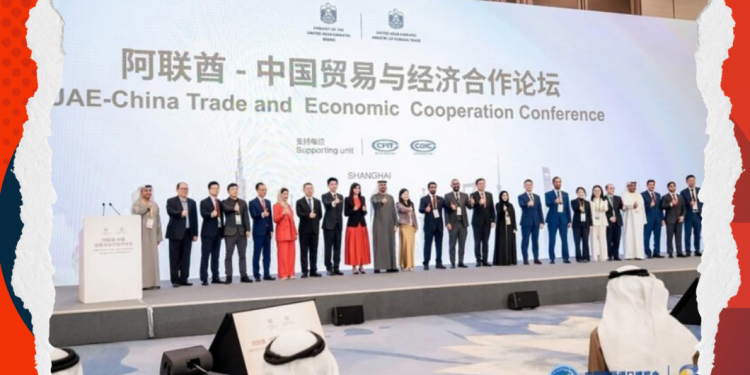The UAE’s Etihad Credit Insurance (ECI) signed a major agreement with China’s Sinosure at the Shanghai Import Expo recently, making their record-breaking $102 billion trade relationship more grounded.
China remains the UAE’s biggest trading partner globally, while the Emirates serves as China’s main gateway to Middle Eastern markets.
Export Credit Partnership Opens New Trade Channels
ECI Chief Executive Raja Al Mazrouei and Sinosure’s Shanghai branch General Manager Lu Dong signed the memorandum of understanding during the 8th China International Import Expo. UAE Foreign Trade Minister Dr. Thani bin Ahmed Al Zeyoudi witnessed the signing ceremony.
The partnership focuses on joint financing for export and investment projects. Both agencies will share market intelligence and environmental, social, and governance (ESG) best practices. The agreement also opens doors for mutual market access and explores opportunities in third-party countries.
“This agreement demonstrates both agencies’ commitment to supporting exporters and investors through shared expertise,” said Al Mazrouei. The deal plans to give UAE exporters more confidence and tools to expand globally while managing risks better.
Strategic Cooperation Beyond Energy Sectors
The partnership extends beyond traditional energy trade. Both nations focus on technology, finance, and infrastructure development. Over 8,000 Chinese companies operate in the UAE, using it as a regional headquarters for Middle East and Africa operations.
The UAE-China Joint Investment Cooperation Fund, worth $10 billion, continues to finance projects in renewable energy, infrastructure, and technology sectors. UAE investment in China jumped 120% recently, while Chinese investment in the UAE grew 16%.
Currency swap agreements between both central banks facilitate trade settlement using Chinese yuan and UAE dirhams. This reduces transaction costs and exchange rate risks for businesses.
New Economy Sectors Drive Future Growth
Both countries signed agreements to strengthen collaboration in emerging sectors. These include entrepreneurship, tourism, technology, circular economy, aviation, and logistics transport.
The UAE-China Joint Investment and Economic Cooperation Working Group, formed under a May 2024 memorandum, supports business development in these new economy sectors. Digital economy cooperation covers 5G networks, artificial intelligence, smart city development, and e-commerce.
Financial integration deepens through major Chinese bank branches in UAE financial centers DIFC and ADGM. Both nations participate in the mBridge project exploring cross-border digital payment solutions.
Export Credit Insurance Strengthens Risk Management
The ECI-Sinosure partnership addresses export credit, trade finance, and risk mitigation needs. Both agencies will collaborate on large-scale infrastructure projects that align with their countries’ long-term strategic goals.
“The UAE and China share strong economic ties, marked by robust trade, significant investment, and extensive cooperation between public and private sectors,” said Dr. Al Zeyoudi. The agreement opens new collaboration avenues across priority sectors.
ECI participated actively in the Shanghai Import Expo, showcasing trade credit and risk mitigation solutions to Chinese businesses. The agency engaged with potential partners and demonstrated UAE’s role as a trading hub.
Regional Trade Hub Position Strengthens
The UAE maintains its position as China’s largest trading partner in the Arab world. Jebel Ali Port serves as a critical re-export hub for Chinese goods destined for Middle Eastern, African, and European markets.
This logistical advantage makes the UAE an essential node in China’s Belt and Road Initiative. The Emirates’ business-friendly environment and world-class infrastructure support this strategic partnership.
Trade projections suggest bilateral commerce could reach $200 billion by 2030. Both nations target sustainable and innovation-driven growth rather than just volume increases.
The partnership demonstrates how strategic alignment and mutual benefit create lasting economic relationships. Success pillars include growing trade volumes, robust investment flows, and diversification into future industries.














